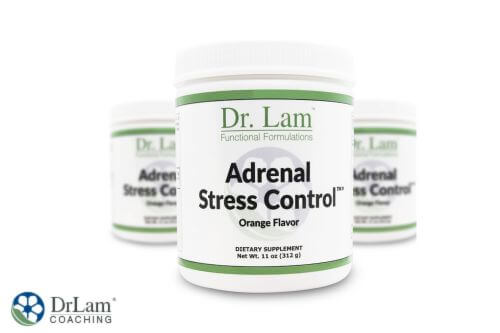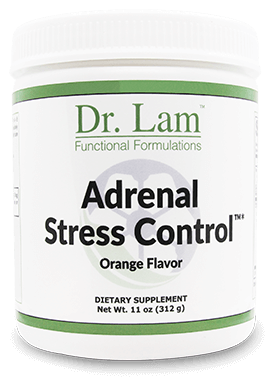 Is adrenal fatigue real? There’s a lot of controversy about this question, with healthcare professionals on both sides of the debate. People who experience ongoing fatigue, sleeping problems, weight gain, salt cravings, and other strange and seemingly disconnected symptoms often visit their doctor, only to be told that they’re fine and nothing’s wrong. And yet at the same time, these people know that something is wrong, and they can’t get the help they need to feel healthy again.
Is adrenal fatigue real? There’s a lot of controversy about this question, with healthcare professionals on both sides of the debate. People who experience ongoing fatigue, sleeping problems, weight gain, salt cravings, and other strange and seemingly disconnected symptoms often visit their doctor, only to be told that they’re fine and nothing’s wrong. And yet at the same time, these people know that something is wrong, and they can’t get the help they need to feel healthy again.
This is where adrenal fatigue comes in, but at the moment, many in the medical establishment don’t recognize it as a condition. So, let’s take a look at what adrenal fatigue is and why it’s so controversial.
Your adrenal glands are two small glands that sit on top of your kidneys. One of their main duties is to secrete cortisol during stressful times. Cortisol is responsible for the "fight or flight" response during stressful events. This activates the stress response, which then helps you survive the cause of the stress by making you stronger, faster, more alert, and preparing your body to respond to damage.
But something goes wrong when you’re chronically stressed, as too many people are in the modern world. With chronic stress, your body continues to demand too much cortisol over a long period. This not only causes declining adrenal function, but it also causes imbalances in the body’s circuits. This can turn into adrenal fatigue syndrome or AFS, which is a non-Addison’s form of adrenal dysfunction, when the body’s stress response can’t keep up with life’s stressors. This condition is often subclinical, which means it doesn’t show up in today’s testing methods, and often goes unacknowledged by conventional medicine.
There are six circuits of related organ systems in the human body, all of which are impacted by cortisol. And when your cortisol levels remain high, these circuits and their components must remain in their stressed state, which means that normal functions are disrupted or halted. Over time, this can cause some varied and uncomfortable symptoms of adrenal fatigue such as:
When you have adrenal fatigue, your body’s circuits become unbalanced and dysfunctional. This is what causes such diverse symptoms, and it’s also what needs to be corrected.
One of the key circuits involved with adrenal fatigue is the Hormone Circuit.
The Hormone Circuit is usually involved early in adrenal fatigue. This is because the Hormone Circuit includes the adrenal glands as one of its three components. The other two components are the thyroid and the reproductive glands, which are the testes in men and the ovaries in women.
 These three components are interconnected and reliant on each other for functioning. So as the adrenals decline in health, the other two components become dysfunctional as well. This creates a downward spiral of symptoms, worsening health in all three related glands. And this adds even more stress to the body.
These three components are interconnected and reliant on each other for functioning. So as the adrenals decline in health, the other two components become dysfunctional as well. This creates a downward spiral of symptoms, worsening health in all three related glands. And this adds even more stress to the body.
When the Hormone Circuit is unbalanced, it can cause symptoms that vary from weight gain and hair loss, because of the thyroid dysfunctions, to infertility and low libido because of dysfunctions in the sex organs. These combine with symptoms such as low energy from fatigued adrenals to create a very confusing mix. And when you add the symptoms and dysfunctions from other circuits into the mix, it can be very difficult for you and your health provider to understand what’s happening with your body.
This confusion and multiple organ and circuit involvement may be one reason why so many people question, "Is adrenal fatigue real?" This may be one reason why you constantly fail to get an answer from your doctors about what’s happening to your body.
When answering, "is adrenal fatigue real?", you first need to know what it is not. Adrenal fatigue is not the same thing as adrenal insufficiency, although they are often confused.
Adrenal insufficiency, or Addison's disease, is a medical condition where your adrenal glands can’t produce the cortisol that your body needs. It causes symptoms like fatigue, low blood pressure, vomiting, nausea, anorexia, and dry skin, and it can be life-threatening. Adrenal insufficiency is easily identified using a cortisol test, which will show low cortisol levels.
However, with adrenal fatigue, your adrenal glands are still producing cortisol. It’s just that your stress levels have been so high for so long, that the adrenals are starting to malfunction because of the high workload. Cortisol levels can be high or low, but still be within normal ranges that are not extreme enough to be considered Addison's. In the earlier stages of adrenal fatigue, your cortisol level will still be normal under testing because your adrenal glands are still working hard. This is why there’s no standard test for adrenal fatigue. It’s only in the later stages of adrenal fatigue that the adrenals start to fail, and cortisol levels become abnormal.
Is adrenal fatigue real? Well, opinion is split at this stage.
If you visit a conventional medical professional, they will likely claim that adrenal fatigue is not real. It’s also not accepted as a medical condition by the endocrine society.
A recent review of studies on the literature about adrenal fatigue found that there’s no scientific basis to accept this condition as a cause of health symptoms. However, the number of studies on the issue is still limited, so further research is needed.
However, this lack of a clear answer may be frustrating if you’re struggling with symptoms and looking for answers. And this is the case for millions of people at the moment, who can’t seem to get the answers they need from conventional medicine.
Advice about this dilemma is divided. However, the consensus seems to be that people who believe they’re suffering from adrenal fatigue should get tested for other causes such as depression and cardiovascular problems, because these can cause similar symptoms to adrenal fatigue and become very serious if not addressed.
If all of those tests are clear, and you’re still feeling tired and experiencing symptoms, then it’s time to look at your lifestyle to work out what might be causing your symptoms.
 If you’re experiencing symptoms associated with adrenal fatigue, then there are things you can do. Life is stressful and stress can be incredibly damaging to the body. That’s why eliminating causes of stress and taking steps to improve your health can only be good for your short- and long-term health.
If you’re experiencing symptoms associated with adrenal fatigue, then there are things you can do. Life is stressful and stress can be incredibly damaging to the body. That’s why eliminating causes of stress and taking steps to improve your health can only be good for your short- and long-term health.
Here are some ideas that can help with that:
If you have ongoing symptoms of any kind, then it’s vital that you see a doctor to eliminate potential serious illnesses. You should also have blood tests and any other tests your health practitioner recommends. It's important to rule out other causes such as:
This is also the time to talk to your health practitioner about saliva cortisol tests and challenges to examine the functioning of your adrenal glands.
The modern world is only just starting to understand how important mental health is. Adopting strategies that improve and safeguard your mental health is one of the best ways possible to improve and protect your overall health. Some ideas that may help with that are:
There’s been a lot of talk these days about cutting down on sleep in order to be more productive. These claims are false at best and incredibly dangerous at worst. Sleep is absolutely vital for your health and healing, so here’s how to improve your sleep routine:
You should be getting regular exercise every day. Just make sure that you listen to your body before you adopt this strategy. When you have adrenal fatigue, adding exercise to your routine can be a cause of stress and may cause an adrenal crash. So, start slowly and gently and listen to your body along the way or work with a health care practitioner who’s aware of adrenal fatigue to add exercise to your routine safely.
Too many people eat a very unhealthy diet, filled with sugar, processed foods, and fat. This is a common cause of adrenal fatigue in today’s busy modern society. The food you eat is supposed to give your body all the nutrients it needs to function at its best, so improving your diet should be one of the first steps to improving adrenal fatigue.
A healthy diet consists of:
You should also try to eliminate foods that cause stress and inflammation such as fatty, processed, or sugary foods. Some people also benefit from eliminating foods like gluten or dairy that cause inflammation, but this can be highly individual, so listen to your body for this.
Supplements can be very helpful in your fight against adrenal fatigue when used correctly. Just remember that supplements can be very powerful and shouldn’t be taken at random. This approach is more likely to cause side effects, interactions with other medications, or additional stress, which isn’t what you want.
Instead, look for a healthcare practitioner who’s aware of adrenal fatigue and can guide you in choosing the right supplements for your needs. Some effective supplements for adrenal fatigue are:
 Adrenal Stress Control is a technologically advanced adrenal, cardiovascular, and collagen-building health drink. This potent mix of prebiotics, amino acids, vitamins, and immune-enhancing nutrients provides the necessary anabolic support to help rebuild the crucial adrenal and cardiovascular collagen network, leading to healthier adrenals, skin, and heart function.
Adrenal Stress Control is a technologically advanced adrenal, cardiovascular, and collagen-building health drink. This potent mix of prebiotics, amino acids, vitamins, and immune-enhancing nutrients provides the necessary anabolic support to help rebuild the crucial adrenal and cardiovascular collagen network, leading to healthier adrenals, skin, and heart function.Is adrenal fatigue real? The literature is divided currently, but that’s often the case with any new condition that has no clear symptoms or method of testing. What’s important is that you know your body better than anyone else, so don’t listen when someone tells you that you’re fine when you know that you’re not. Here’s what to do instead:
Don't let adrenal fatigue hold you back from living your best life. Take the first step to reclaim your vitality and well-being with Dr. Lam's Adrenal Fatigue Recovery Program. In this program, you'll gain the knowledge and tools you need to understand your condition, optimize your lifestyle, and embark on a journey toward a healthier, more energetic you.

Regain balance and vitality with Adrenal Stress Control
Answering the question, is adrenal fatigue real, isn’t simple or straightforward at the moment. There’s a lot of debate about this condition, but what’s important is that you listen to your body when something’s wrong and keep looking for answers to better your health.